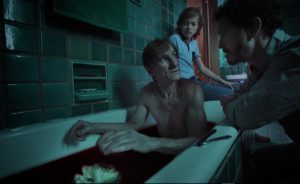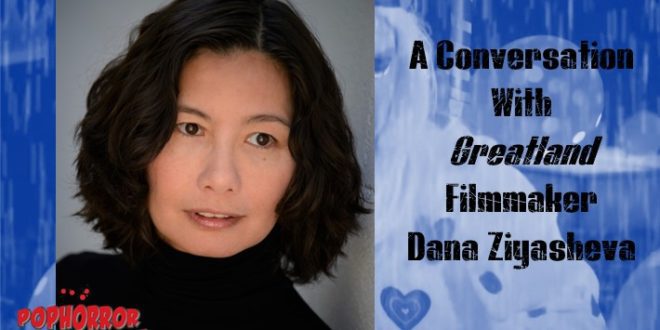When we think of filmmakers in the movie industry, the first thing that comes to mind are people who have spent their entire lives watching movies. They’re creatives who have imagined telling their own stories, setting up shots and writing lines for tales yet to be told. But there is another kind of filmmaker, one who hears news stories and can’t rest until those true life accounts are brought out into the light of day. The kind of person who hears the truth and just has to tell it. I was honored today to speak with such a filmmaker.
Worldly and unafraid, Dana Ziyasheva started her life in a quaint southern city at the foothills of the Tian Shan mountains in Kazakhstan before moving on to work for the UN through UNESCO (United Nations Educational, Scientific and Cultural Organization) to bring awareness to problems in the world that many people choose to ignore or even participate in. Through this socially diverse experience, Ziyasheva is able to look at the world in a totally unique way, which is why her feature film debut, Greatland, may not reach everyone upon first viewing.
In this interview, we discuss Greatland, her colorful and rich history working for the UN, and her desire to open up the minds of the people around her.
https://www.youtube.com/watch?v=lDny3vKBWRk
Greatland synopsis:
Trapped in a world of perpetual fun and inter-species love ruled by a universal Mother, a teenage boy crosses the forbidden frontier to save his childhood sweetheart as an absurd election and a deadly virus lead to chaos and violence.
PopHorror: Hello, Dana! Thanks for speaking with me today.
Dana Ziyasheva: Yes, of course!
PopHorror: Can you tell me a bit about your pre-filmmaking life?
Dana Ziyasheva: I grew up in Almaty, Kazakhstan. I was there when the Soviet Union was crumbling. People were dying by scores, hyper-inflation, planes not flying, gas shortages. But it was also a fun time to be alive, because one could become rich overnight, and we were finally free to travel and pursue our individual goals. Kazakhstan became an independent country.
As a TV journalist, I covered all these stories for morning news and criminal chronicles. I was the first person from independent Kazakhstan to join UNESCO as an international civil servant. I worked at UNESCO Headquarters in Paris before volunteering to develop education programs in Northern Iraq. Throughout my career as UNESCO Adviser for Communication and Information, I was stationed in Beijing, China, San Jose, and Costa Rica and travelled to more than 80 countries. My job was to encourage under-represented and marginalized groups to express themselves through words and images, to find their voice and speak the truth.
For example, with Mongolian Education TV, we travelled to Tsaatan people. They are reindeer breeders; in summer, they camp high up in the mountains of Mongolia. We somehow convinced them to do a short film with us. I had to fly a tiny airplane, drive a jeep across grassland, and for the final ascent to the glacier, ride a specially trained horse up the mountain ridges teeming with wolves and bears. My biggest reward was working with Tsaatans. They were so game to shoot a movie and natural in front of the camera!
The Tsaatan experience encouraged me to direct my first feature Defenders of Life with a secluded Ngabe indigenous tribe in Costa Rica. In 2013, I provided them with computers, cameras, and media training as a part of my UNESCO job. Their language and culture were becoming extinct, so we decided to immortalize its beauty in a movie.
My film, Defenders of Life, is about the tradition of child brides and whether it should be honored to this day or not. I showed the perspective of the 12-year-old girl, her grandmother, the 60-year-old shaman who sets his eyes on the girl, the local police, and the woke white anthropologist who comes to “study and promote Ngabe culture” but ends up succumbing to her most primeval instincts of protecting her son from the tribe.
In fact, if you look deeper in history, the tradition of child brides originated with conquistadors. They were raping young indigenous girls, and it was the matter of tribe self-preservation that the girls would get married as soon as they reach puberty. Does this tradition need to continue to this day, though? Ngabe felt that they said what they wanted to say. The government of Costa Rica felt that they heard what they wanted to hear. As result, child marriages were outlawed in Costa Rica.
PopHorror: Did your previous work in UNESCO inspire Greatland at all?
Dana Ziyasheva: Definitely. I don’t take sides, that comes from my international civil servant background. Impartiality as a principle comes from the journalist ethics code I was taught in College. I’m often asked, “What side are you on?” I’m but an observer, my films are mirrors that show a wide range of perspectives and bias from different angles. It’s up to the audience to decide which side to take. Alternatively, the audience could choose to go beyond bi-partisan struggle toward something more constructive, positive, and unifying.
Ideas for Greatland’s world-building came from all over the world. For example, in China, during the construction boom, I saw many building sites where a huge banner of an architectural marvel to come, would hide filthy slave-like dwellings in which construction workers were living. The trick was to get people excited about a new shopping paradise and overlook the misery it was built on. In Greatland, your eye is instantly attracted to the fun bright posters—never mind the crumbling infrastructure behind these posters. Greatland shows how the power of suggestion can alter our perception of reality.

PopHorror: What were the reactions to Greatland so far?
Dana Ziyasheva: Pretty visceral! “What’s this garbage! Nonsense! What the WTF did I did I just watch?” And I’m like, “Guys, have you heard of metaphors? Allegories?!” On social media, debates around Greatland seem to focus on what I was taking when making the movie: Acid, shrooms, or something psychotropic. First of all, I have no idea how drugs work. And second, the reality is so crazy, who needs drugs anyways!
When Greatland premiered in movie theaters at the Moscow Film Festival, some conservative viewers and critics walked out of the cinema. They thought that Greatland promoted tree-marriages and a cult-like Dark Temple Ceremonies. Some people were more like, “Oh, you are mocking LGBTQ; you are mocking vegans; you are mocking feminism. How dare you?!” But I don’t! Greatland isn’t supposed to be taken at face value. People get desensitized to thinking, to analyzing a piece of art. [They think] a movie should be easy to consume. If it’s not pre-chewed, they just discard it.
PopHorror: I totally agree. So many people just want to be spoon-fed, which is really sad.
Dana Ziyasheva: Exactly! Audience needs validation and guidance from the media, critics or influencers, to make its mind about the movie. Wouldn’t it be more fun to go out of your comfort zone, go on a wild ride—just you and Greatland!—with no pre-conceived idea of where it should end?

PopHorror: On the surface, Greatland is about this boy living in a world where everyone is told to be happy, despite what’s going on around them. They’re told to be themselves, but only if their version of themselves fits into what Mother tells them that they can be. They must be accepting of all things, including being forced into interspecies love, or else they’re punished. But what is it really about?
Dana Ziyasheva: Ulysses and just about every character in Greatland represent certain tendencies in the society. Those who think that the film is anti-LGBTQ or anti-feminist are completely off-target. The film is not about ideals of tolerance and diversity versus conservative Stone Age values.
The second half of the movie shows the elite or 1-percenters pulling the strings behind the scene, the precious Z-generation being played by boomers. Greatland is about subverting and weaponizing humanistic ideas to set one part of the population against another in order to divert attention from a systemic crisis. Basically, in Greatland, the general population gets what they’re told they want, and the elite gets what they actually want. The social strata lives separate lives, and everybody is happy. The only problem is, as Clerk puts it, “Social peace is fragile. Greatland’s losing economic and technological advantages to Evildom.”
My ambition is that after everything’s said and done, there is an understanding of how suicidal it is to keep shouting at each other from opposite corners. Wouldn’t be better to get together and find a compromise and a way forward?
 PopHorror Let's Get Scared
PopHorror Let's Get Scared




